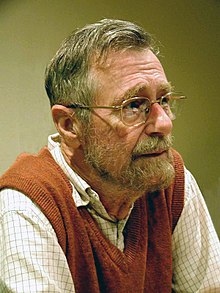Portal:Systems science
The systems science portal
 |
| Complex systems approach |
Systems science is an transdisciplinary[1] field that studies the nature of systems—from simple to complex—in nature, society, cognition, engineering, technology and science itself. To systems scientists, the world can be understood as a system of systems. The field aims to develop interdisciplinary foundations that are applicable in a variety of areas, such as psychology, biology, medicine, communication, business management, engineering, and social sciences.
Systems science covers formal sciences such as complex systems, cybernetics, dynamical systems theory, information theory, linguistics or systems theory. It has applications in the field of the natural and social sciences and engineering, such as control theory, operations research, social systems theory, systems biology, system dynamics, human factors, systems ecology, systems engineering and systems psychology. Themes commonly stressed in system science are (a) holistic view, (b) interaction between a system and its embedding environment, and (c) complex (often subtle) trajectories of dynamic behavior that sometimes are stable (and thus reinforcing), while at various 'boundary conditions' can become wildly unstable (and thus destructive). Concerns about Earth-scale biosphere/geosphere dynamics is an example of the nature of problems to which systems science seeks to contribute meaningful insights.
Selected article -
In mathematics and science, a nonlinear system (or a non-linear system) is a system in which the change of the output is not proportional to the change of the input. Nonlinear problems are of interest to engineers, biologists, physicists, mathematicians, and many other scientists since most systems are inherently nonlinear in nature. Nonlinear dynamical systems, describing changes in variables over time, may appear chaotic, unpredictable, or counterintuitive, contrasting with much simpler linear systems.
Typically, the behavior of a nonlinear system is described in mathematics by a nonlinear system of equations, which is a set of simultaneous equations in which the unknowns (or the unknown functions in the case of differential equations) appear as variables of a polynomial of degree higher than one or in the argument of a function which is not a polynomial of degree one.
In other words, in a nonlinear system of equations, the equation(s) to be solved cannot be written as a linear combination of the unknown variables or functions that appear in them. Systems can be defined as nonlinear, regardless of whether known linear functions appear in the equations. In particular, a differential equation is linear if it is linear in terms of the unknown function and its derivatives, even if nonlinear in terms of the other variables appearing in it. (Full article...)Selected picture
'WikiProjects
Selected biography -
Edsger Wybe Dijkstra (/ˈdaɪkstrə/ DYKE-strə; Dutch: [ˈɛtsxər ˈʋibə ˈdɛikstra] ⓘ; 11 May 1930 – 6 August 2002) was a Dutch computer scientist, programmer, software engineer, and science essayist.
Born in Rotterdam, the Netherlands, Dijkstra studied mathematics and physics and then theoretical physics at the University of Leiden. Adriaan van Wijngaarden offered him a job as the first computer programmer in the Netherlands at the Mathematical Center in Amsterdam, where he worked from 1952 until 1962. He formulated and solved the shortest path problem in 1956, and in 1960 developed the first compiler for the programming language ALGOL 60 in conjunction with colleague Jaap A. Zonneveld. In 1962 he moved to Eindhoven, and later to Nuenen, where he became a professor in the Mathematics Department at the Technische Hogeschool Eindhoven. In the late 1960s he built the THE multiprogramming system, which influenced the designs of subsequent systems through its use of software-based paged virtual memory. Dijkstra joined Burroughs Corporation as its sole research fellow in August 1973. The Burroughs years saw him at his most prolific in output of research articles. He wrote nearly 500 documents in the "EWD" series, most of them technical reports, for private circulation within a select group. (Full article...)Did you know
- ... that self-organization is a process of attraction and repulsion in which the internal organization of a system, normally an open system, increases in complexity without being guided or managed by an outside source?
- ... * continuing vertically with a science of design,
- ... that the American ecologist Howard T. Odum in 1950 gave a novel definition of ecology as the study of large entities (ecosystems) at the "natural level of integration".
- ... * and next a science of action, called "Interactive management".
Categories
Related portals
Topics
Tasks
 |
Here are some tasks awaiting attention:
|















